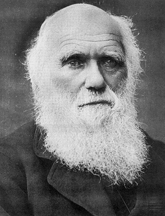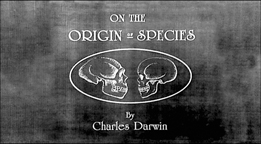|
Special tribute to Charles Darwin:
"The origin of species"
by Dr. P. Nilanthie DASANAYAKA
November 24 marked the 150th anniversary of "The origin of species"
publication (1859) which is one of the most famous and influential books
of all time. It has caused to change development of human thoughts over
since. February 12 of this year celebrated the 200th birthday of the
writer of this book: Charles Darwin, throughout the world. Many other
events have been organized throughout this year to celebrate both
anniversaries. Therefore it was thought to keep a special note here to
pay special tribute to this great scientist in celebration of his life
and work especially as the founder of modern evolutionary biology.
 Charles Robert Darwin was an English naturalist who was born on
February 9, 1809 in Shrewsbury, England. His father Robert Waring
Darwin, was a successful and wealthy physician who sent Charles to
medical school in Edinburgh, Scotland in 1825. But after attending two
surgeries he decided not to be a doctor, as surgeries were performed
without anesthesia or pain killers at that time. Then his father was
worried and sent him to Cambridge University with the aim of being a
minister of the Church of England. Charles enjoyed Science and Nature
best of all there with his favourite hobby of collecting beetles. His
favourite professor at Cambridge was John Steven Henslow who taught
Botany. This friendship could change Charles's life. Charles Robert Darwin was an English naturalist who was born on
February 9, 1809 in Shrewsbury, England. His father Robert Waring
Darwin, was a successful and wealthy physician who sent Charles to
medical school in Edinburgh, Scotland in 1825. But after attending two
surgeries he decided not to be a doctor, as surgeries were performed
without anesthesia or pain killers at that time. Then his father was
worried and sent him to Cambridge University with the aim of being a
minister of the Church of England. Charles enjoyed Science and Nature
best of all there with his favourite hobby of collecting beetles. His
favourite professor at Cambridge was John Steven Henslow who taught
Botany. This friendship could change Charles's life.
The story of Charles Darwin and his theory began in 1831, when he was
22 years old. On the recommendation of Professor John Steven Henslow he
was selected to serve as naturalist on a five-year navigational mapping
expedition around the coasts of South America, aboard HMS Beagle. During
this long voyage, Charles had a chance to study a wide variety of plants
and animals on continents and in distant seas.He was able to explore the
biological richness of tropical forests, examine the extraordinary
fossils of huge extinct mammals in Patagonia and observe a remarkable
series of related but distinct forms of life on the Galapagos Islands.
This opportunity clearly played an important role in the development of
his thoughts about the nature of life on earth. At the beginning of the
voyage Charles believed that species were unchanging and immutable. But
he observed that living and fossil organisms are directly related to one
another in the same area. Further he saw the characteristics of closely
related organisms that convinced him that a process of evolution had
taken place.
Combining observations with what he had seen on the voyage as well as
with his own experience in breeding domestic animals, Charles made an
important association. The individual with superior physical and
behaviourial characteristics are more likely to survive than individuals
that are not so well endowed. These individuals with more suitable
characteristics tended to leave more offspring and so become more common
in future generations. Charles called this as natural selection. On the
24th of November 1859, Charles Darwin published "The origin of species"
in which he proposed that the mechanism of evolution was natural
selection. The first small edition of this book, 1,250 copies was sold
on the day of publication, and a second edition of 3,000 copies soon
afterwards. Sixteen thousand copies have been sold only up to 1876
indicating how stiff a book it is. It is still considered as one of the
most important books on science ever written.
This theory: Natural selection marked out for controversy from birth.
 Darwin's claim was that natural selection could explain the diversity
or all life on earth, from bacteria to barnacles, orchids, fish,
lizards, mushrooms, pine tree, elephants, bananas, insects and bonobos.
According to Darwin, the varieties of forms that are observed arose
because "as many more individuals of each species are born than can
possibly survive; and as, consequently, there is a frequently recurring
struggle for existence, it follows that any being, if it vary however
slightly in any manner profitable to itself, under the complex and
sometimes varying conditions of life, will have a better chance of
surviving, and thus be naturally selected. From the strong principle
inheritance, any selected variety will tend to propagate its new and
modified form". The theory's application has not been limited to
biology. In the past few decades, it has jumped to many other
disciplines, with papers on natural selection appearing in the
scientific journals of, among others, anthropologists, sociologists,
philosophers, economists, mathematicians and statisticians,
demographers, physicists and even surgeons, yielding a wide
distribution. Darwin's claim was that natural selection could explain the diversity
or all life on earth, from bacteria to barnacles, orchids, fish,
lizards, mushrooms, pine tree, elephants, bananas, insects and bonobos.
According to Darwin, the varieties of forms that are observed arose
because "as many more individuals of each species are born than can
possibly survive; and as, consequently, there is a frequently recurring
struggle for existence, it follows that any being, if it vary however
slightly in any manner profitable to itself, under the complex and
sometimes varying conditions of life, will have a better chance of
surviving, and thus be naturally selected. From the strong principle
inheritance, any selected variety will tend to propagate its new and
modified form". The theory's application has not been limited to
biology. In the past few decades, it has jumped to many other
disciplines, with papers on natural selection appearing in the
scientific journals of, among others, anthropologists, sociologists,
philosophers, economists, mathematicians and statisticians,
demographers, physicists and even surgeons, yielding a wide
distribution.
As evolutionary studies enter the genomic era, biologists are finding
out more and more about how genes combine with a surprisingly large
range of genetic regulatory mechanisms to produce complex systems that
are the phenotypes of organisms such as us. Human genome project has
been completed and it has revealed that the variation is less than 1% of
the population.
That means all the variations like health, personality, intelligence,
beauty among human beings are regulated by less than of the genome. It
is believed that it might have a regulatory role in human society not
unlike that of gene regulation and this may have enhanced human
survival.The ability of natural selection to keep up with the times as
more and more questions are asked, shows that far from being old at 150,
Darwin's theory still has a spring in its step.
The writer is a Senior Lecturer, Department of Botany University of
Sri Jayewardenepura. |

